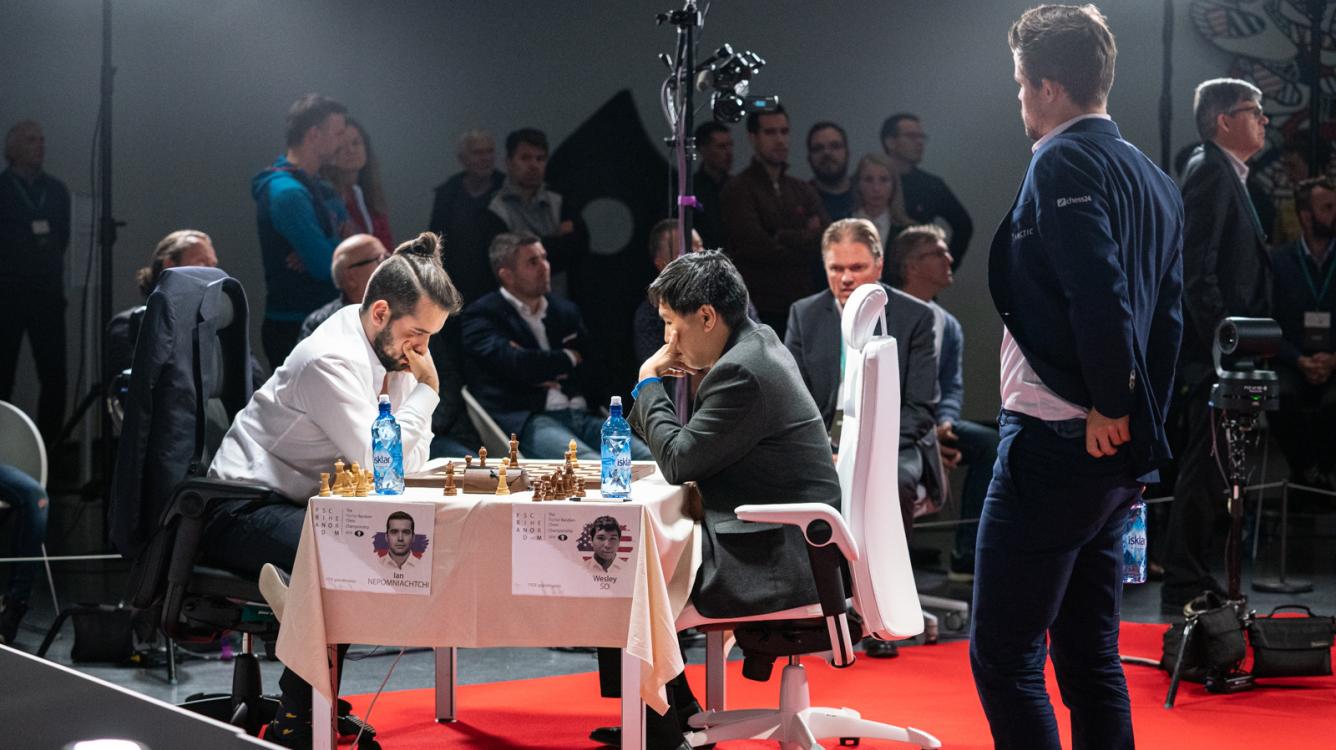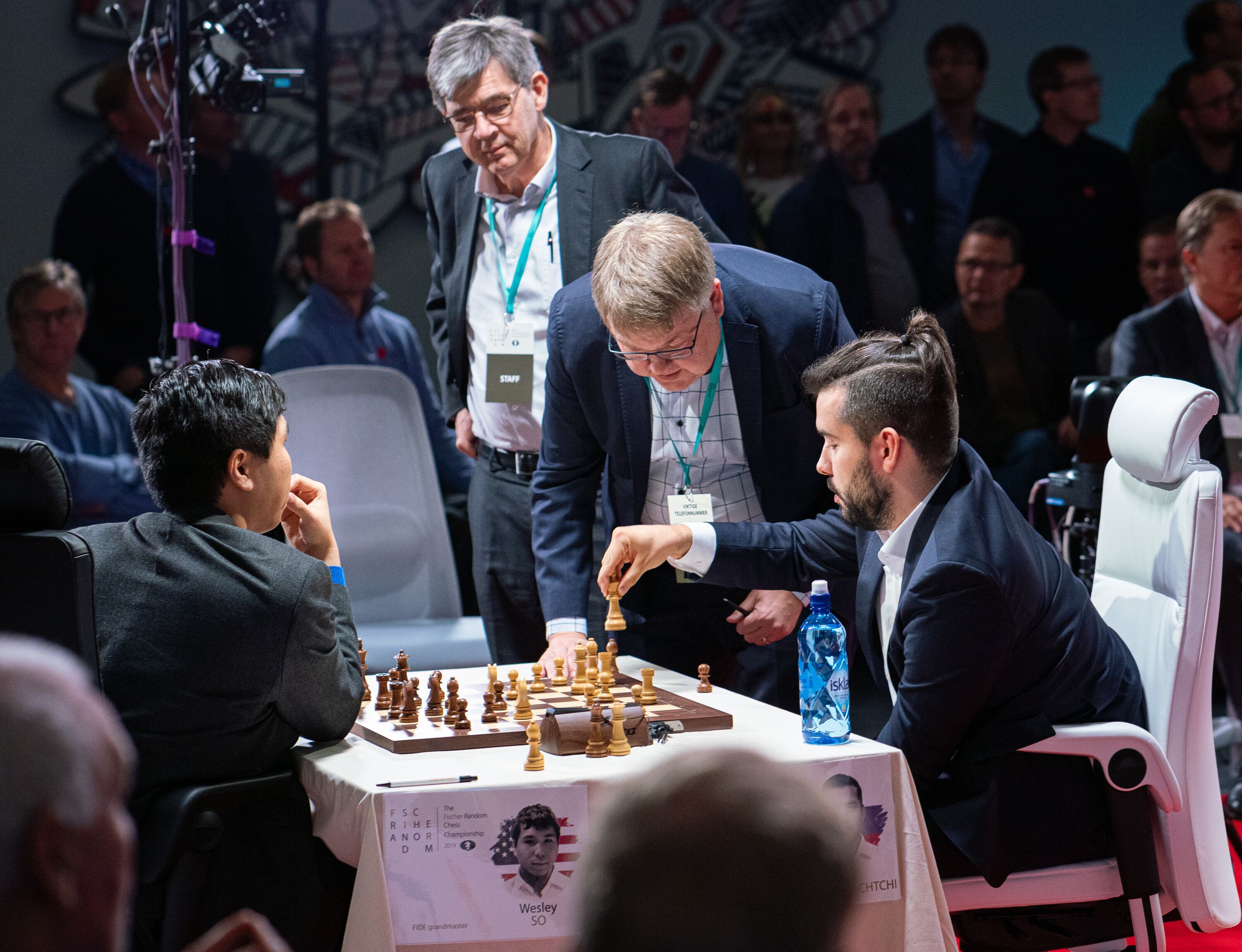
Today: Carlsen To Play So For Fischer Random World Championship
The two finalist spots were decided before the blitz segment of the World Fischer Random Chess Championship on Wednesday. After emerging victorious from their semifinal matches, Wesley So and Magnus Carlsen will play the final from October 31 to November 2 beginning at 9:30 a.m. Pacific (17:30 CET) on Twitch.tv/Chess and Chess.com/TV.
So needed only three fast-rapid games against Ian Nepomniachtchi to book his seat in the title match, but there was plenty of drama, including one replay, two arbiter interventions and an appeals-committee ruling.
The tension in the spotlight on the Carlsen vs. Fabiano Caruana match was focused entirely on the board. This duel was full of nerve and resilience, but the American took too many risks in the fourth and final rapid game, and the Norwegian kept his cool to earn a showdown with So.
What is Fischer Random Chess (Chess960)? Find out here!

The FIDE World Fischer Random Chess Championship can be watched live at www.Chess.com/TV and www.Twitch.tv/Chess. The day three broadcast can be seen here.
The start position for the first pair of games definitely intrigued the players, with bishops in the corners and rooks more or less ready-centralized. Their different reactions to the unveiling were revealing: Carlsen said the setup looked quite exciting, Caruana felt it looked more harmonious than the previous ones, Nepomniachtchi said it would be difficult for him, and So enthusiastically began reeling off loads of possible opening lines he could imagine.

Carlsen-Caruana quickly looked like a normal Leningrad Dutch. While the champ began to methodically increase his advantage, all eyes turned to a long and lively discussion on the other board, where the arbiters were talking to Nepomniachtchi, and kings and rooks were being waved around, while a bemused So looked on.
When they eventually resumed play, So accepted a draw offer fairly quickly, and explanations began to emerge.

Meanwhile, in chess action, Carlsen was playing some fine chess but was also clearly not in tune with the time control. With only a two-second increment, he was playing too slowly to convert his advantage in the face of tricks and resilience, and was happy just to force a perpetual check at the end.

In another plot twist, Nepomniachtchi and So reappeared and started to play again, with the same colors—and for a minute, what looked like would be the same position. In fact they were starting afresh. The appeals committee decided that the original ruling, that Nepomniachtchi had to move his rook since it had been touched first when castling, should be reversed. Having examined the video, the committee felt it was clear that he was trying to castle, and was put off by his rook being on g1 and in the way of his king.
This explained why So had been gesturing to him originally (showing him how he himself had castled one-handed) and why Nepomniachtchi stared intently at the arbiters before castling in the replay, which greatly amused So. It should be noted that So did not protest during the first game, the arbiters spotted the 'infraction," and perhaps a raised eyebrow from So.

On the live broadcast Jeroen van den Berg, chairman of the appeals committee, explained their decision.
The popular chess figure "Mr. Dodgy" had perhaps the best take on the controversy around difficult castling in Fischer Random:
A true pro would pick up the rook from g1, toss it up in the air, slide the king to g1 and the rook would land dead centre of f1. Press the clock, lean back in chair. Flex. #frchess
— MrDodgy (@ChessProblem) October 29, 2019
Finally, when all was said and done, the first Nepomniachtchi-So fast-rapid game was a real barn-burner, and another near-miss for the Russian.
The incredible levels of on-board violence and excitement continued in the next round. Rapid chess tends to liven things up in general; when you are without bearings from move one and the action accelerates the way it does in Fischer Random, high-impact collisions are guaranteed.
Carlsen singled this game out as providing a euphoric rush of enthusiasm for Fischer Random: "I was really thinking this is why we play Fischer Random; you play g5, h5 and suddenly your position is great. It adds a new dimension...that shows why this game has a right to exist at the very highest level!" said Carlsen.
As flashy as that game was, it was nearly impossible to look away from the incredible sustained brawl going on in So-Nepomniachtchi.

This pair of wins by the match leaders pushed their opponents to the brink. When the new position was revealed for the second pair of fast-rapid games, Carlsen's lead had grown to a commanding 10.5-5.5 with eight points left to play for. This made the calculation for Nepomniachtchi—who trailed 4-12—easy indeed: He needed to win all remaining games to take So to Armageddon.
This task proved impossible at once. The most tedious position of the event was achieved, and even after winning an insufficient pawn Nepomniachtchi was foiled when So called the arbiters into action anew and alertly claimed a repetition of position, despite being down to 30 seconds on his clock. The Russian GM bowed out 5-13, and still apparently felt as "robbed" he did on day one.
So here comes the daily wisdom: play badly, but always be resourceful :/
— Yan Nepomniachtchi (@lachesisq) October 29, 2019
Despite having had to endure another loss with White, Caruana made the first move count in the second start position, turning what appeared to be an extremely complicated position into a clearly winning one with some fine tactical play. Carlsen dragged things out but with the clock against him as well, he couldn't conjure up any miracle escapes.

While this win reduced the gap back to three points, time was running out for Caruana. A draw in the final fast-rapid game would leave him needing 3.5/4 in the blitz section, a very tall order against Carlsen. With this certainly in mind, the American came out swinging a little too hard, too quickly, and seemed to get a simply hopeless, quite chess-like position a pawn down.
Admittedly feeling the onset of nerves and fatigue, Carlsen made things sharper than necessary just to regain a feeling of control. He won the resulting tricky ending, and with it, the match.

A lovely interview with Magnus Carlsen after day three from the live broadcast.
You can find all the games from Day 3 in the player below:


The FIDE World Fischer Random Chess Championship continues on Oct. 31 at 17:30 CET, 9:30 a.m. Pacific, and can be watched live at www.Chess.com/TV and www.Twitch.tv/Chess. The day three broadcast can be seen here.
Previous reports:
- FIDE World Fischer Random Chess Championship Quarterfinals Kick Off
- Second Chances In World Fischer Random Chess Quarterfinal
- Caruana, So, Nepomniachtchi Headed To World Fischer Random Semifinals
- FIDE World Fischer Random Chess Championship Finals Begin Sunday
- The Final Test Begins In The World Fischer Random Chess Championship
- Carlsen, So Lead World Fischer Random Championship

